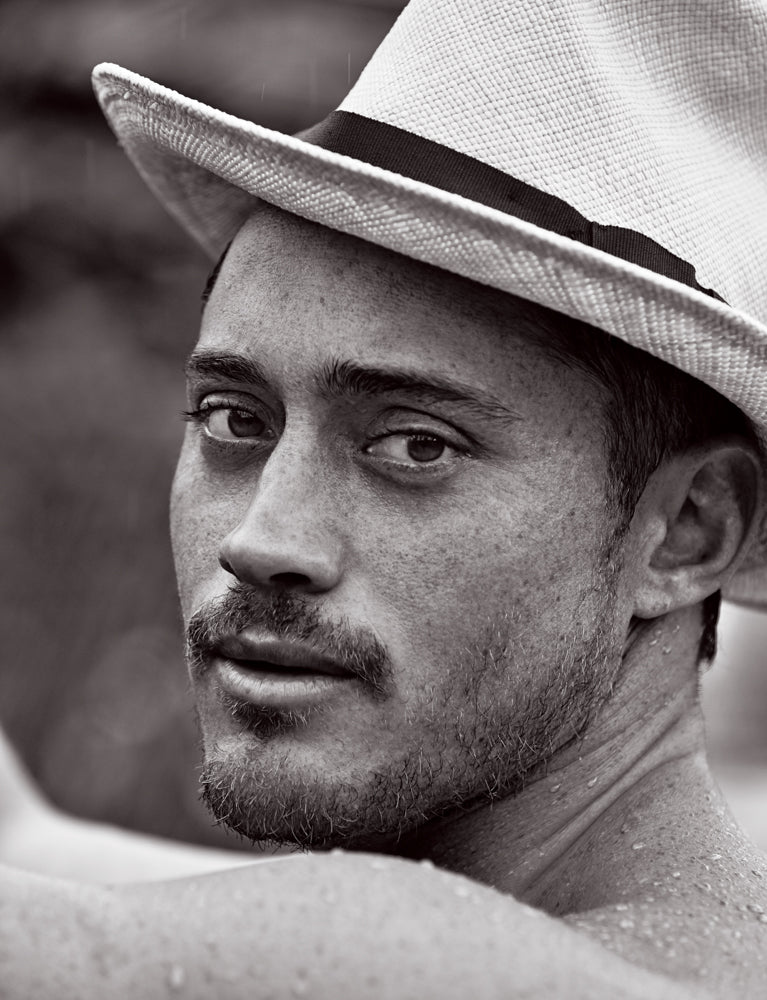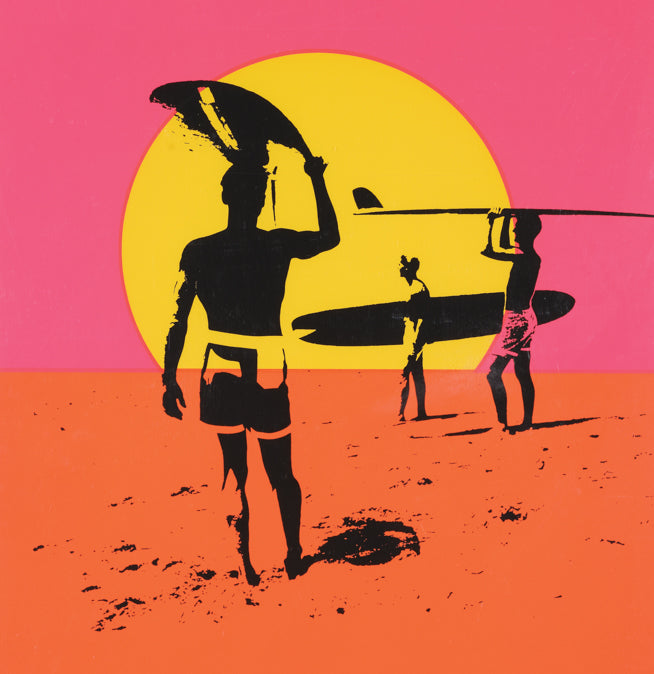
Makua Rothman
MAKUA ROTHMAN

In mid-May, a photograph of the big wave surfer Makua Rothman, thick blood spewing from his jaw, minutes after a wipe-out, riveted across the digital globe from Teahupo’o, Tahiti.
The surf break, where tons of seawater sucks up into a monstrously thick tube a few inches over the razor edge of a coral reef, had ‘gone off’, drawing to it the world’s most accomplished and charging surfers. Rothman is one such man, for sure. A decade ago, he won the Billabong XXL Big Wave Awards but on the first day of the swell at Teahupo’o he’d fallen, and the reef slashed open his jaw turning his lip and the skin below it into a flab hanging from his chin. Out in the water alone, Rothman had the wherewithal to piece his face back into place, stick a finger in a hole in his chin through which his tongue popped-out, and organize his rescuers.

If he looks aware of the severity of his injury in the image of him standing on the back of a jet ski gripping the life jacket of the surfer who ferried him to safety, he also looks utterly focused and composed. But then, Rothman has spent a lifetime with the wave.
When he was an eight-year-old kid he had found himself in the middle of Waimea Bay — a place that has cost grown men their lives and left others defeated, saved only by helicopter rescue – crying
He had just reemerged to the universe of oxygen after the roil of a two-wave hold-down. Though a small day at Waimea, a freak set – a sudden series of ten-foot waves — had entered the bay and Rothman had ended up off his board, underwater, pummeled. So, yes, he was crying. It wasn’t just fear.


The son of a native Hawaiian and a Jewish guy who had settled on Oahu, Rothman grew up on one of the island’s other mythic surf breaks, Sunset Beach. “I learned to surf there. I learned to spear fish there. I learned to kiss there. I learned how to win there. I learned how to lose there. Everything I’ve learned in my life I’ve learned at Sunset Beach,” he says.
He also learned of many of his heroes there, and some of those heroes were at Waimea the day he was taken out by the set. He had paddled out to be with them — the greatest big wave surfers in the world — for the opening ceremonies of the Edie Aikua.
Part-surf contest, part-initiation ritual, part-sacred experience, the event that honors Aikua, the waterman who disappeared in open ocean as he tried to rescue a group of friends, is surfed in by invitation only and held only when the waves are big enough — twenty- feet or more. Floating amongst the greats of the sport, on the day that marked the beginning of the waiting period for such a swell, Rothman had acted like one of them when he was just a little kid. And then the freak set hit.

He was crying because he was scared he would be sent back to the beach without catching a single wave in front of them. He caught a wave.
Six years later, at age fourteen, Rothman — whose asthma as a child was so acute he’d end up in the hospital hooked to a machine to breathe, downing medicines to stay alive like some kids are given lolli- pops, would be towing in at Jaws, the Maui big-wave.
Four years after that, he would win the Billabong XXL Big Wave Awards care of a 66-foot monster—outracing a moving wall of water cascading down on him like a six story building during an earthquake. “It’s not how you start, it’s how you finish,” Rothman points out about the challenges of life. And so it was that at eighteen, he returned to the opening ceremony of the Edie—this time as one of the handful of men under thirty from around the world that is deemed an invitee and welcomed to the brethren of big wave surfing.


“He does not so much dig into bottom turns as seem to follow the wave into its own mystery without equivocation.”
Professionals, watermen, brothers who could live up to the screed that Aikua launched — “Edie would go,” no matter the conditions or odds. He is the youngest ever to be so honored. Though, for the most part, he has given up surfing the World Tour contest circuit, he has beaten its pros and in May he went to catch the swell at Teahupo’o.
But this summer, Rothman had planned not to follow the swell, instead he’d sing on tour with his band and play the Ukulele. “To kill a culture first you have to kill the language,” says Rothman on a recent day as he talks about the forcible taking of Hawaii by America.
“If you have your language you can always teach, you can always perpetuate your culture, [but] America made it illegal for us to speak our own language, to dance our own dance, to practice our own traditions. They tried to wipe us out. Hula is amazing, the only way to keep our culture alive,” he continues in a voice drenched in the modulations of Hawaii, not its invader.

If Rothman credits his father for giving him surfing, he says his grandparents, Hawaiians — through whom he dates back eleven generations to the great Hawaiian King Kamehameha — brought him music.
Rothman doesn’t have a finite memory of when the Ukulele entered his life, but it’s been there for as long as the wave. His grandfather, a retired Honolulu city bus driver, can play any instrument put in front of him. His grandmother, a Kekela’okalani and a kuma hula — or a hula master — is a dancer of sixty years. His mother has danced since Makua was two.
With the hula came music, and with music came the Ukulele. Rothman first learned it at the foot of his grandmother whom he still returns to to learn from.

Rothman has always played at home and wherever he travels (Brazil, Japan, Australia, Israel), when he spends time with friends, in surf shop appearances, or in clubs or larger venues. But the notion of stringing together a tour, of being a professional musician, was initiated by his fitness coach Robert Garcia.
“Do you want to be like three thousand other surfers, exactly like them, going to these same swells, or you want to add a little more to your swagger,” Garcia challenged Rothman about a year-and a half ago. “Trust me on this one time — try and see where your music will take you.”
Rothman cancelled his trip to the waves of Indo. In December 2012, he released an EP titled Makanale Road and his American tour dates this summer include New York.


In the water, surfing, Rothman can have a lightness to him — an ease as if he is a few pounds lighter than any other surfer or even lighter than the weight of his own body. He does not so much dig into bottom turns as seem to follow the wave into its own mystery without equivocation. He’s so good that to watch him surf, is to see none of his talent or skill or knowledge — all of which fall away — leaving visible only pure joy, an homage to the sea.
When Rothman talks about his accomplishments as a pro-surfer, the smallest tinge of edge creeps into his voice, an inflection that reminds you that you might respect these victories. And you probably should.
On land, if Rothman wants, he can melt into non-descriptness. A guy hidden under a sponsor’s hat shuffling through — say Venice Beach — so anonymously that neither a professional photographer nor a skateboarder being shot on the boardwalk realize one of the world’s greatest surfers is passing.

There are other Rothmans, too. The Rothman of business ambitions, who, now in his late twenties, has spent most of his life dealing with sponsors. And understands corporate workings more fully than any eighteen-year-old dreaming of an MBA. That Rothman is focused, serious, strategic.
He has traveled deeper and farther and further and by a younger age than any armed-with-assistants, soft CEO — and that is the Rothman of logistics who commandeers the most micro of details. As comfortable as he is facing the ambiguity of a wave he knows that to stay alive, in both the sea and the environment of man’s making, is to be utterly, completely prepared.
And then there are the other Rothmans too, like the one who stops an interview with a magazine to pick up his cell. “Hi, gorgeous,” he says with a beaming smile and warm eyes and charisma so strong it drips into the phone and seduces the walls off the conference room where he sits.

“Everything I do, I do for the Hawaiian people,” says Rothman. “We’re such a small people, we come from such a little place, somebody’s got to do it.”
“I’m doing a little interview right now,” he con- tinues, his Hawaiian flecked voice dropping into an almost whisper, that brings him and who ever it is that he’s talking to, into their own secret space. “But I seen you calling…”
And then there is that Rothman — the curious, mischievous one — that leans over, investigates the writer’s notes, sees “hi, gorgeous” and… laughs. To know Makua, to even meet him once, is to hear that laugh. And that is the Rothman of the Ukulele. And that Rothman is a man of exceeding generosity.
No matter where he is, and whether he has a Ukulele with him or not, if you ask Rothman to — he will make calls, borrow an instrument and play for you. Like that day at Waimea Bay in front of his heroes, Rothman does not like to disappoint. “I have a thing that if anybody asks me to please play a song — I will,” he says.
That “thing” is a gift of his friend, the late “Junior” Seau who coaxed the surfer into playing for him one night at a restaurant he owned in San Diego. “Let the band,” Rothman said initially ret- icent but eventually capitulating. A week later, Seau was gone, a suicide. “He gave me an invaluable lesson,” Rothman says. “I may never see my friend again… So [to] enjoy a good moment, a laugh and a good song — it just means the world to me.”

“No matter where he is, and whether he has a Ukulele with him or not, if you ask Rothman to — he will make calls, borrow an instrument and play for you.”
No matter where he is playing, Rothman brings a welcoming warmth and lightness with him. Consider it Aloha.
When he sings, his voice is as effortless as a surfer playing with a wave he grew up in, as magical as “Hi, gorgeous.” Rothman’s always had a beautiful voice but he learned to just let it float from another childhood teacher, Israel Ka- makawiwo'ole, the “Ole” of Somewhere Over the Rainbow. The eight-hundred pound great, hooked to an oxygen tank to breath, would also impart the kid with something else: “Take your Hawaiians where you go and share it with the world and be proud to be a Hawaiian no matter what.”
As a weapon, the Ukulele seems small. Yet, in Rothman’s hands, it steals back the Polynesian culture ravaged by luxury hotels, the appropriation into tourist toys on Waikiki, and the American businessmen who led the coup in the late 1800s that gutted Hawaii’s independence.
“Everything I do, I do for the Hawaiian people,” says Rothman. “We’re such a small people, we come from such little place, somebody’s got to do it.” If you ask him, he will tell you, that though he can write songs in and understands Oleloe — the language of his grandmother and mother, he’s not one hundred percent fluent in it. But he’s working on it.



